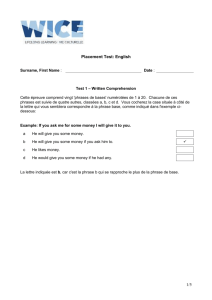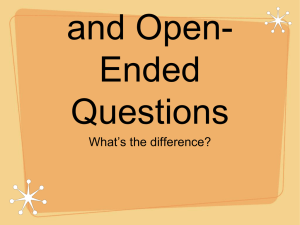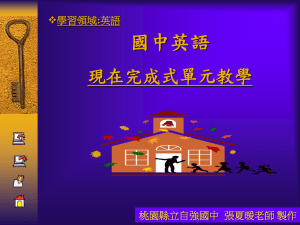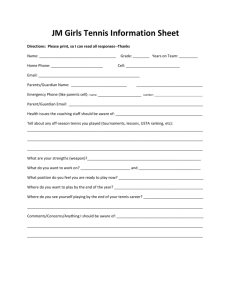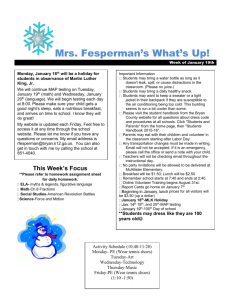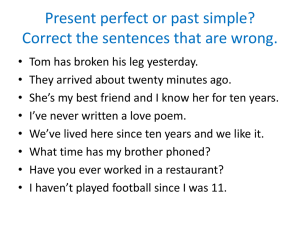Placement Test - ENGLISH 16June 2010
advertisement
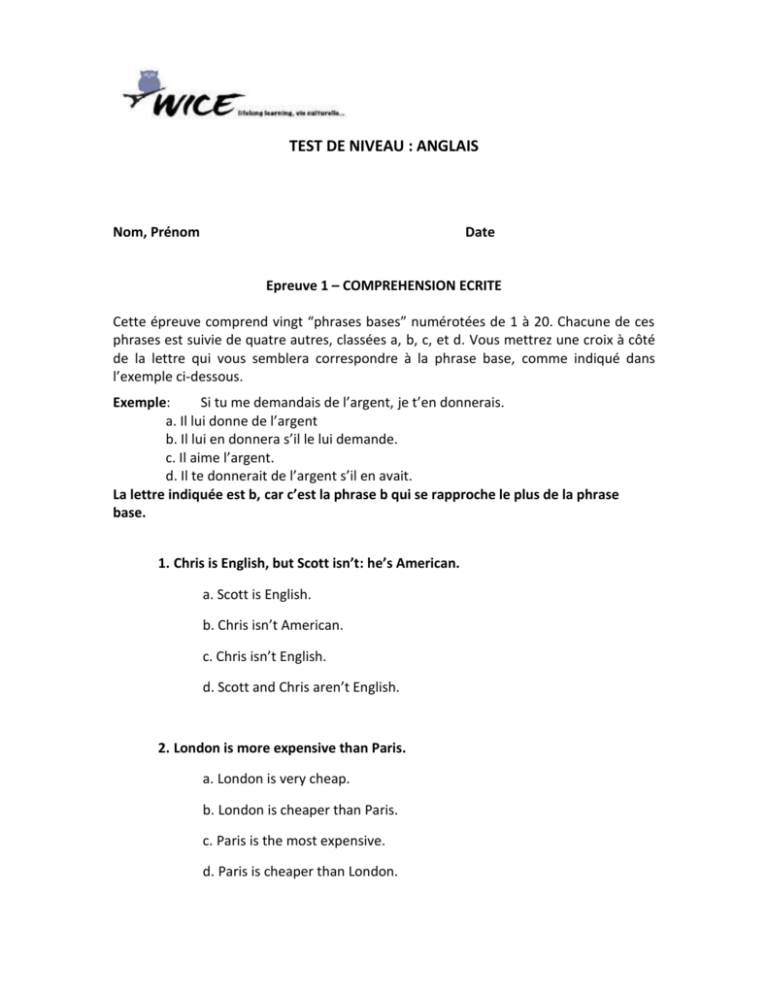
TEST DE NIVEAU : ANGLAIS Nom, Prénom Date Epreuve 1 – COMPREHENSION ECRITE Cette épreuve comprend vingt “phrases bases” numérotées de 1 à 20. Chacune de ces phrases est suivie de quatre autres, classées a, b, c, et d. Vous mettrez une croix à côté de la lettre qui vous semblera correspondre à la phrase base, comme indiqué dans l’exemple ci-dessous. Exemple: Si tu me demandais de l’argent, je t’en donnerais. a. Il lui donne de l’argent b. Il lui en donnera s’il le lui demande. c. Il aime l’argent. d. Il te donnerait de l’argent s’il en avait. La lettre indiquée est b, car c’est la phrase b qui se rapproche le plus de la phrase base. 1. Chris is English, but Scott isn’t: he’s American. a. Scott is English. b. Chris isn’t American. c. Chris isn’t English. d. Scott and Chris aren’t English. 2. London is more expensive than Paris. a. London is very cheap. b. London is cheaper than Paris. c. Paris is the most expensive. d. Paris is cheaper than London. 3. We are looking for new customers. a. We’re trying to find new customers. b. We can see new customers. c. We are looking at our new customers. d. We’re interviewing new customers. 4. Jesse and Sandra are eating in a restaurant. a. They always eat in a restaurant. b. They ate in a restaurant. c. They will eat in a restaurant. d. They are in the restaurant now. 5. Kevin can’t go to the meeting tomorrow. a. He can only go to the meeting. b. He mustn’t go to the meeting. c. He won’t be able to go to the meeting. d. He may not go to the meeting. 6. My boss wants me to go to Chicago. a. I want my boss to go to Chicago. b. My boss wants me to stay here. c. He asked me to go to Chicago. d. My boss wants me to leave Chicago. page 2/6 7. Pamela may arrive soon, but I don’t know when. a. She has permission to come. b. She can come soon. c. It’s possible that she’ll come soon. d. She’s arriving late. 8. The manager was told not to recruit any sales reps. a. He didn’t want to recruit. b. The manager had said not to recruit. c. He received instructions not to recruit. d. The manager spoke about not recruiting. 9. Jack and Toby e-mail each other every Sunday. a. They e-mail themselves every Sunday. b. Jack e-mails Toby and Toby e-mails Jack every Sunday. c. Each one writes the other’s messages every Sunday. d. Both of them e-mail all their messages on Sunday. 10. Mr. Johnston should get more exercise. a. He would like to get more exercise. b. He ought to get more exercise. c. He would get more exercise if he could. d. He might get more exercise. page 3/6 11. Her brother hardly works at all. a. He works very hard. b. He practically never works. c. All his work is very difficult. d. He does hard work all day. 12. I was supposed to see the director this morning. a. I had an appointment to see him, but didn’t go. b. People thought I saw the director this morning. c. I supposed the director would see me this morning. d. The director wanted to see me this morning. 13. Ms. West has worked here for about 25 years. a. She is retired. b. She has lots of experience here. c. She left the company 25 years ago. d. She has a lot of time. 14. Shall I ask him to come in? a. May I ask him to come in? b. Will I ask him to come in? c. Can I ask him to come in? d. Do you want me to ask him to come in? 15. Mr. and Mrs. Hart remembered to lock their door before leaving. a. They remembered locking the door. b. They remembered that the door was locked. c. They didn’t forget to lock the door. d. They left locking the door. 16. Joanna had her dress cleaned yesterday. a. Her dress was clean yesterday morning. b. She had to clean her dress yesterday. c. Her dress was cleaned for her yesterday. d. She cleaned her dress yesterday. 17. She’d rather drive than take the train. a. She’d better drive. b. She’d prefer to drive. c. She’d driven enough. d. She drives more often than she takes the train. 18. Either bus goes to the Techno Center. a. Both buses go there. b. All the buses go there. c. No buses go there. d. Any bus goes there. 19. If it had been sunny yesterday, I’d have played tennis. a. When it was sunny, I would play tennis. b. If it weren’t raining, I’d play tennis. c. I didn’t play tennis because of the weather. d. It wasn’t sunny yesterday, but I played tennis. 20. Mr. Campbell doesn’t have to work today. a. He mustn’t work today. b. He can’t work today. c. He can choose not to work today. d. He has no work to do today. NOTE : /20 page 6/6
